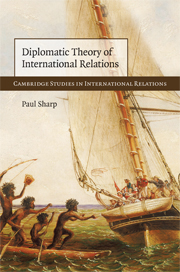Book contents
- Frontmatter
- Contents
- Acknowledgements
- Introduction
- Part I Traditions of international thought and the disappointments of diplomacy
- 1 Diplomacy and diplomats in the radical tradition
- 2 Diplomacy and diplomats in the rational tradition
- 3 Diplomacy and diplomats in the realist tradition
- Part II Elements of a diplomatic tradition of international thought
- Part III Diplomatic understanding and international societies
- Part IV Thinking diplomatically about international issues
- Conclusion
- Bibliography
- Index
- Cambridge Studies in International Relations
2 - Diplomacy and diplomats in the rational tradition
Published online by Cambridge University Press: 05 June 2012
- Frontmatter
- Contents
- Acknowledgements
- Introduction
- Part I Traditions of international thought and the disappointments of diplomacy
- 1 Diplomacy and diplomats in the radical tradition
- 2 Diplomacy and diplomats in the rational tradition
- 3 Diplomacy and diplomats in the realist tradition
- Part II Elements of a diplomatic tradition of international thought
- Part III Diplomatic understanding and international societies
- Part IV Thinking diplomatically about international issues
- Conclusion
- Bibliography
- Index
- Cambridge Studies in International Relations
Summary
Wight's rational tradition identifies approaches to international thought which assume individual human beings are its proper subjects, and that their affairs are best addressed by the application of reason, both to the challenges and opportunities which they face, and to the processes by which arguments over what to do about them are settled. Put thus, it is a broad and attractive church, for who would openly disagree with putting individuals first, and who would not prefer reason to other methods, even of merely getting one's own way? Ask diplomats, of course, and they will tell you that, when it comes to international relations in particular, a great many people, leaders and followers alike, subscribe to neither principle, but that they, the diplomats, are among the strongest supporters of reason in both respects.
This claim has considerable purchase. There is certainly overlap between the habits of mind and vocabulary of the rational tradition and the diplomatic tradition of international thought. Both are interested in dampening passions and moderating egos by reducing ignorance and elevating reason, and both are interested in the resolution of conflicts by procedures that encourage fair compromises. The overlaps, however, are apt to lead to more confusion than clarity, for the differences between the two are considerable, especially on the question of procedures for resolving disagreements and how they are to be established and operate.
- Type
- Chapter
- Information
- Diplomatic Theory of International Relations , pp. 39 - 52Publisher: Cambridge University PressPrint publication year: 2009



